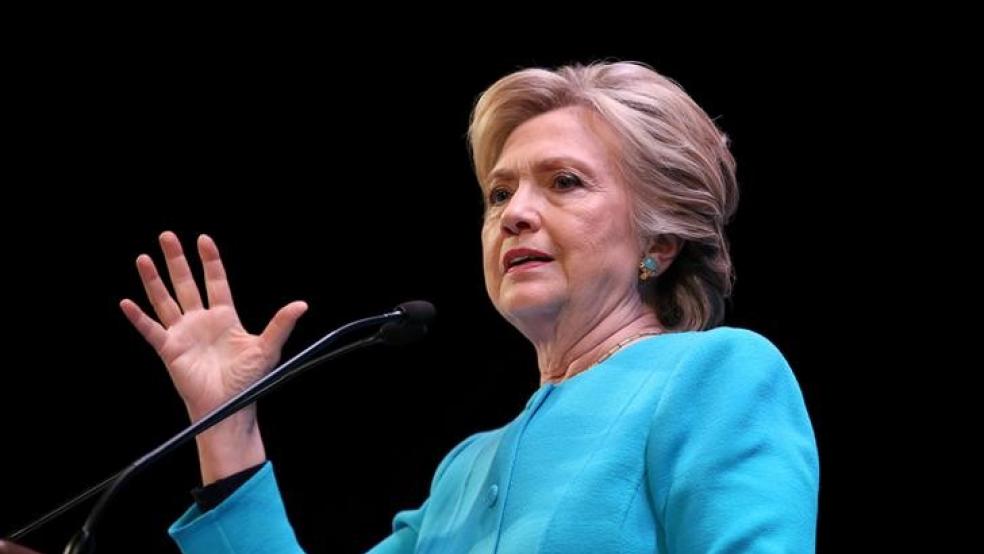FBI Director Jim Comey’s explanation of why his agency would not recommend a criminal prosecution of presumptive Democratic presidential nominee Hillary Clinton for her use of a private email server during her time at secretary of state has raised questions about whether her “extremely careless” handling of classified information might affect her ability to serve in the White House.
In a press release earlier this week, presumptive Republican nominee Donald Trump suggested that it might.
Related: GOP Demands New Criminal Investigation of Clinton, This Time for Perjury
“The normal punishment, in this case, would include losing authority to handle classified information, and that, too, disqualifies Hillary Clinton from being President,” it read.
On Thursday, House Speaker Paul Ryan formally asked the Director of National Intelligence to block Clinton from receiving national security briefings.
“As a former vice presidential nominee, I am keenly aware that Secretary Clinton is set to begin receiving classified intelligence briefings after the Democratic National Convention,” he wrote in a letter to DNI James Clapper. “However, Director Comey stated that ‘this is not to suggest that in similar circumstances, a person who engaged in this activity would face no consequences. To the contrary, those individuals are often subject to security or administrative sanctions.’ Given the FBI’s findings, denying Secretary Clinton access to classified information certainly constitutes appropriate sanctions. This is necessary to reassure the public that our nation’s secrets are secure.”
Ryan’s letter did not suggest that Clinton should be denied access to classified information should she be elected president -- in practice, she probably couldn’t be. And in fact, President Obama could overrule Clapper even on the question of candidate briefings. But the implication was clear that Ryan -- and many in and out of the Republican Party -- are concerned about giving Clinton unfiltered access to national security information.
Related: We Now Know Hillary Clinton Should Have Been Indicted...But That Won’t Matter
In truth, following revelations that she used an unsecured email server to transmit highly classified information, and used unsecured mobile devices to access the same account while traveling in foreign countries with sophisticated intelligence services, Clinton probably couldn’t get any sort of security clearance without direct presidential intercession.
In fact, as John Fund noted at The National Review, success at the ballot box in November might be the only way Clinton can ever get an official security clearance again.
But there is virtually no question that Clinton, if elected, would have access to any national security intelligence information she wanted.
In general, the ability to declare a piece of sensitive information related to national security classified -- and by extension, to define who may and may not have access to it -- flows from the executive branch. And because the president is the ultimate authority within the executive branch, it is effectively incoherent to ask whether a president has the necessary clearance to view classified information.
Related: Get Ready for 4 more years of GOP Investigations If Clinton Wins
In practice, rules about the classification of national security information do not originate in Congress, but from executive orders. In 1940, according to the Congressional Research Service, Franklin D. Roosevelt broke from the precedent of leaving classification decisions to the military when he issued an executive order allowing government officials to protect information related to the location of military facilities.
Since then, presidents have regularly updated executive orders related to secrecy, relying for some decades now on a Supreme Court ruling that found the authority to classify information related to national security arises from the president’s constitutionally granted status as commander-in-chief. In the case of Department of the Navy v. Egan, the court ruled, “Authority to classify and control access to information bearing on national security ... flows primarily from this Constitutional investment of power in the President and exists quite apart from any explicit congressional grant.”
Interestingly, though, the executive branch does not have the explicit ability to deny members of Congress access to classified information on an individual basis. For example, a lifelong civilian elected to Congress has no less a right to see intelligence data than a former Central Intelligence Agency officer who wins a seat in the district next door.
According to the CIA itself, “All Members of Congress have access to intelligence by virtue of their elected positions. They do not receive security clearances per se.”
Related: Clinton Dodges Indictment, but Not the FBI Director’s Scorn
However, that doesn’t mean that a newly elected legislator can simply knock on the door at Langley and expect the CIA to hand over its files.
“There are no written rules, agreed to by both branches, governing what intelligence will be shared with [Capitol] Hill or how it will be handled,” the agency notes. “The current system is entirely the product of experience, shaped by the needs and concerns of both branches over the last 20 years. While some aspects of current practice appear to have achieved the status of mutually accepted ‘policy,’ few represent hard-and-fast rules. ‘Policy’ will give way when it has to.”
Bottom line, though, is that the president is usually the final arbiter of what is and is not considered classified, and who should have access to it. That means that, for better or for worse, Hillary Clinton’s use of a private email server as secretary of state will have no effect on her access to classified information should she be elected president.





